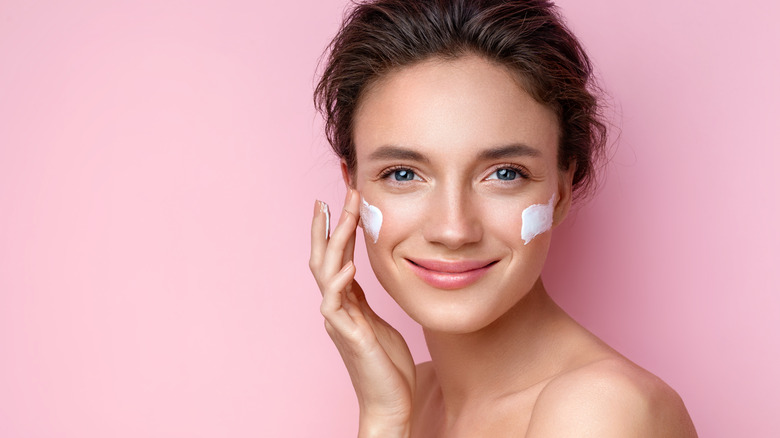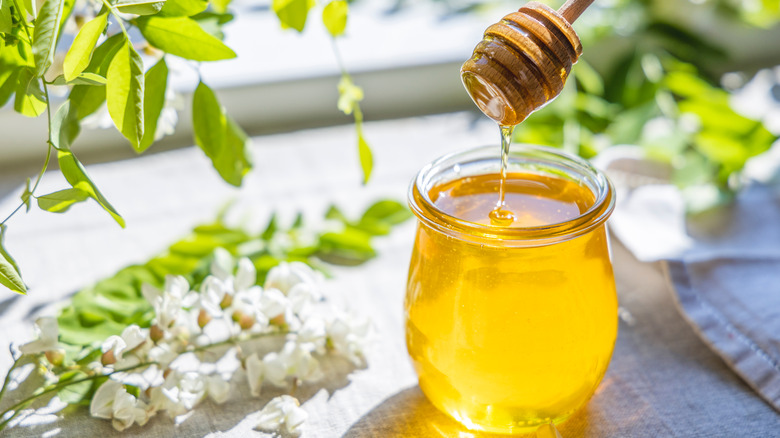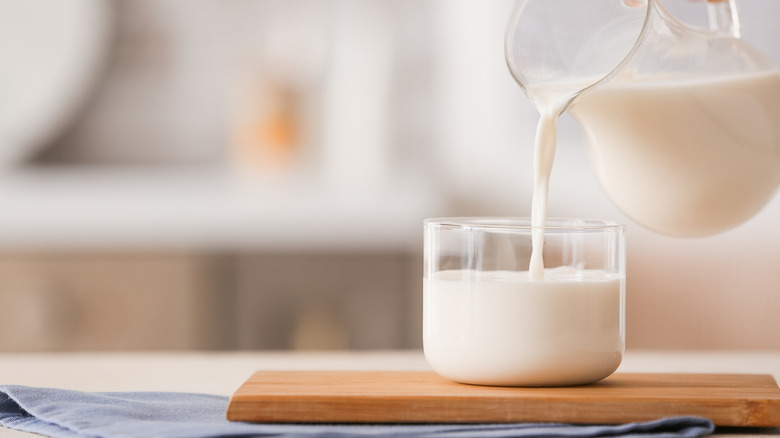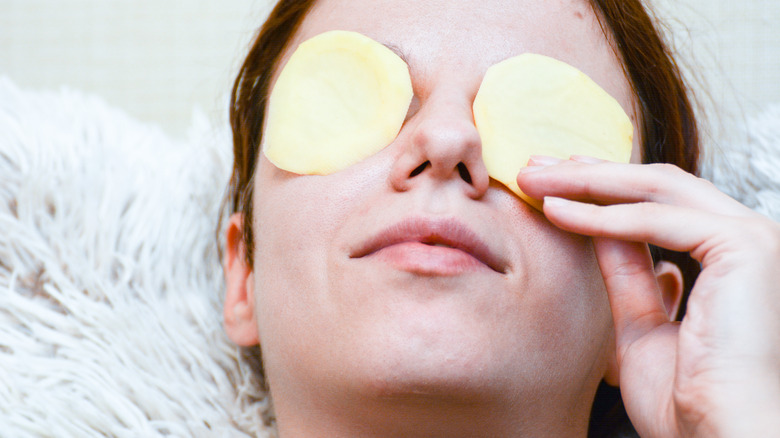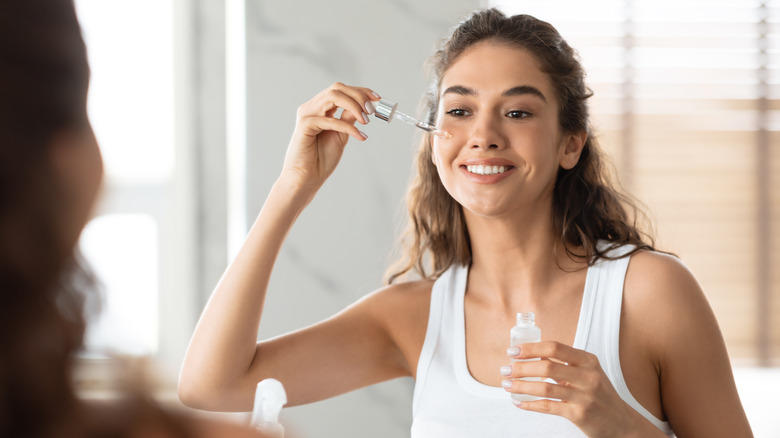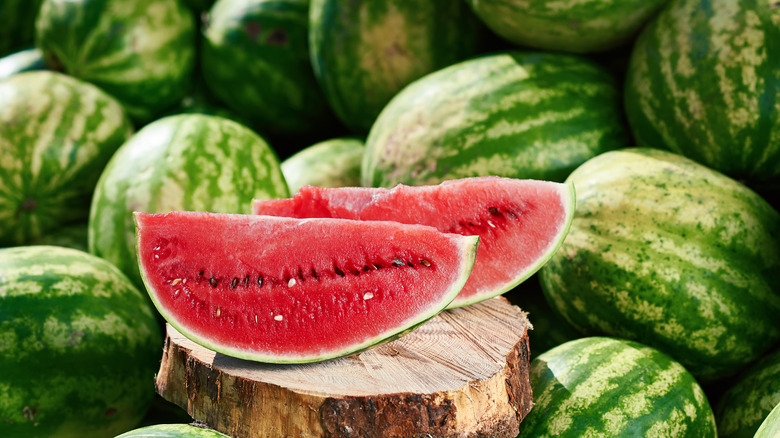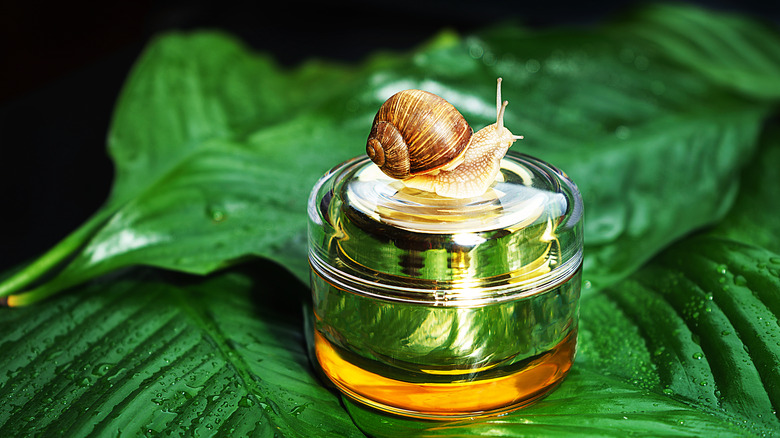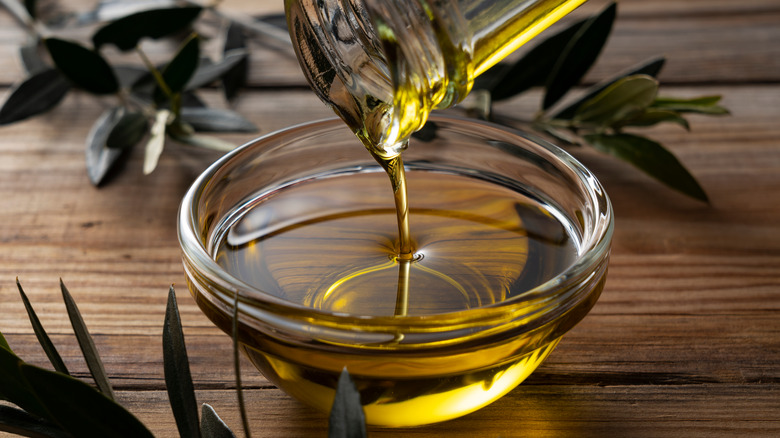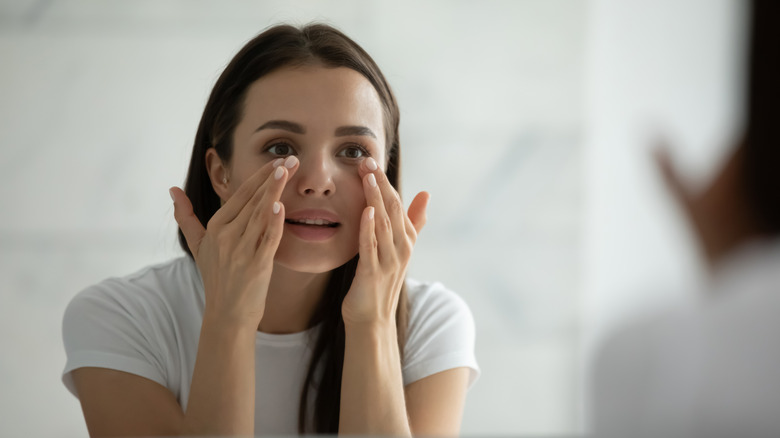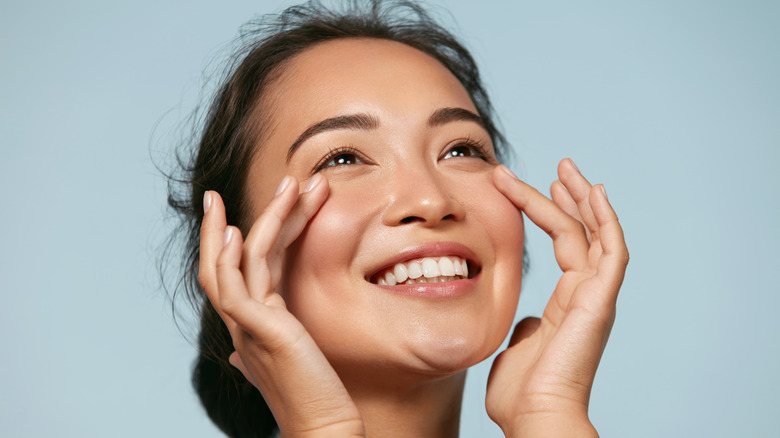Oddly Satisfying Tricks To Get Perfect Skin
We may receive a commission on purchases made from links.
Perfect skin — we're all on the never-ending quest for it. Just about every day, there seems to be a new, arguably bizarre trend sweeping the skin care community that purports to be the be-all and end-all of everyone's skin care woes. But, considering the quick manner that information circulates these days (we're talking about you, TikTok), it can be hard to differentiate between the many passing fads and the methods that actually work.
By now, you have probably heard about the benefits of gua sha or hyaluronic acid, but with so many dermatologists and skin care experts at our fingertips these days, there is finally sufficient research on many of the lesser-known practices. We've tracked down some seemingly unusual tricks that are actually proven to give you the healthy and radiant skin you've been after. If you're looking to invest in your skin care game this year, we have you covered.
Use laxatives for oily skin
Milk of magnesia has an obvious effect on your body when ingested. However, it can also serve a purpose when applied topically. This laxative draws moisture into the body, according to Medical News Today. This certainly helps with constipation, but when applied to the skin, milk of magnesia may be effective in breaking up excess surface oils as well, ultimately assisting with acne, sunburn, and oily skin.
Some makeup artists even swear by using milk of magnesia as a primer or toner to balance skin complexion and control shine (via Marie Claire). Just apply a thin layer to your face after moisturizing, allow it to dry, then continue your normal makeup routine. However, it's recommended that you use this trick sparingly. As dermatologist Joshua Zeichner told Today, "True makeup primers are engineered to do their job. While Milk of Magnesia can serve a similar purpose when applied topically on your face, I would recommend using it only when you are in a jam, rather than for regular use."
Wash your face with honey
Although slapping some sugar onto your face might sound counterintuitive, many unexpected skin care benefits come from it. A 2013 review published in the Jundishapur Journal of Natural Pharmaceutical Products showed that honey is antibacterial and anti-inflammatory. The antibacterial properties within honey help rid your pores of dirt, delivering smooth and bouncy skin. Honey is considered a humectant, which means it is able to draw moisture out of your skin without making it oily (via Women's Health).
Due to its natural moisturizing properties, honey can also be used as an excellent treatment for wounds, eczema, and other skin conditions. It is recommended to wet your face or mix water with your honey before application to make it easier to smooth (via Byrdie). Honey must be raw or unfiltered in order to deliver the desired natural glow to your skin.
If putting raw honey directly onto your face sounds a bit too messy for you, there are also tons of skin care products that have incorporated honey into their ingredients. But be aware that most cosmetic products only contain 1 to 10% honey, according to a study published in the Journal of Cosmetic Dermatology.
Milk can benefit your complexion
One of the most beneficial ways to utilize milk isn't even by drinking it. According to Healthline, consuming dairy may negatively impact your skin. However, using it topically can have the opposite effect. An emerging trend among the skin care community is applying milk to your skin to achieve a brighter, smoother complexion.
Milk contains lactic acid, as well as vitamins and biotin (via IPSY). Lactic acid is an alpha hydroxy acid, which is an ingredient that many modern skin care products contain in order to fight bacteria, dead skin, and wrinkles (via Healthline). Thanks to the vitamin B6 and biotin contained in milk, incorporating it into your skin care routine will boost your skin's moisture content, combat acne, and soothe redness and irritation.
While cow's milk is a safe and easily accessible option, others have also come to swear by goat's milk and donkey's milk when it comes to skin care.
Forget cucumbers – try potatoes
Potatoes aren't just used in your air fryer anymore. Believe it or not, raw potatoes and potato juice have a ton of skin care benefits. Potatoes are loaded with Vitamin C and catecholase, an enzyme with mild bleaching and brightening properties, which may help diminish hyperpigmentation. While anecdotal evidence exists, Healthline explains that "there's no clinical evidence to prove that catecholase in potatoes can lighten your skin."
Apart from potentially treating discoloration, potatoes may have acne-fighting benefits as well. Next time you're struggling with puffy eyes or dark circles, consider using slices of potato under your eyes, instead of the all-popular cucumber.
Board-certified dermatopathologist Gretchen Frieling told Byrdie that "starches soothe inflammation and absorb oil," making them the perfect solution to oily skin. "[Studies] have led researchers to find that potato glycoalkaloids and other chemical compounds have the potential to reduce cytokines and inflammation," Freiling further told Byrdie. This may help ease inflamed acne and mitigate the pain that comes along with it.
Rejuvenate your skin with placenta products
While Kourtney Kardashian might have scarred us all for life when she pretended to secretly cook up her placenta for her family, the properties within the organ surprisingly seem to have anti-aging effects when applied to the skin. Enter: placenta products. Products made with sheep placenta have been said to refresh and rejuvenate dull skin while correcting skin texture (via Byrdie). Admittedly, research on this trend is limited. However, according to a 2017 study, placenta serum contains antioxidant properties that may have the ability to protect you from free radicals.
Due to its ability to lower oxidative stress and reduce inflammation, placenta serum is believed to be capable of supporting wound healing (via Healthline). However, its main use is to reduce the look of dark spots, moisturize, and tighten skin, while delivering an even complexion. Dermatologist Dr. Harold Lancer told Byrdie, "There is empiric evidence and clinical photographic data indicating a significant benefit from placenta cream if the product is properly created." In simpler terms, if you're considering giving this one a shot, opt for the higher-quality (and unfortunately more expensive) products to get the desired results.
Quench dry skin with watermelon
Watermelon doesn't just hydrate the inside of our bodies – it can have benefits when applied directly onto the skin as well (via IPSY). Watermelon has the ability to fuel collagen production, nourish dry skin, reduce inflammation, and calm sunburns and irritated skin. Given that watermelon is made up of vitamin A, C, and E as well as 92% water, it's the perfect natural solution to dry skin. According to Mind Body Green, "Vitamin E provides moisture [while] vitamin C helps lock it in for an overall plump, healthy complexion."
While the main purpose of watermelon in skin care is to moisturize, it can be used as a toner as well. And, as Jennifer Yen, founder of PURLISSE skin care, told IPSY, "Watermelon is rich in malic acid, which helps remove dead skin cells, but will never give your skin that tight feeling because of its multiple moisturizing properties."
Nourish your skin with snail mucin
While this admittedly sounds disgusting, the slime that snails leave behind them might have some elite skin care benefits. Now, relax – we're not telling you to go outside and stick a snail on your face. Instead, why not try one of the many brands that have begun to incorporate this ingredient into their products? Snail mucus, also known as snail mucin, this natural extract contains many skin-loving ingredients like hyaluronic acid, antioxidants, and glycolic acid (via Women's Health).
Snail mucin's hyaluronic acid components help to lock in moisture at the skin's barrier. Its glycolic acid promotes collagen production, therefore tackling fine lines, dermatologist Hadley King explained to Women's Health. Snail mucin is also said to contain anti-inflammatory properties that soothe skin irritation. Just like most other skin care regimens, it's recommended that you consult your dermatologist before using products that contain snail extract, as some skin types might have a negative reaction to it (via WebMD).
Moisturize with cooking oil
Oil really just makes everything better ... including your skin. Board-certified dermatologist Neda Mehr told RealSimple, "Olive oil is an excellent skin moisturizer, especially when applied to wet skin when the pores are open, and can act as a second skin barrier for dry, cracked skin in the winter." Some people also swear by using cooking oil in place of makeup remover (via Vice). And the best part? It's already sitting in your pantry. As Dr. Michele Green, a board-certified cosmetic dermatologist, explained to Vice, oil attracts the fatty membranes that surround makeup, making it a gentle and inexpensive substitute for store-bought makeup remover.
Each type of cooking oil contains its own benefits and nutrients, so be sure to select the correct type of oil for your personal skin type. The vitamins, proteins, and fatty acids present within avocado oil, in particular, make it one of the best types for moisturizing, without leaving a greasy texture behind, according to Healthline. Coconut oil is loaded with lauric acid, which is considered the "number one source of antimicrobial properties, especially when it comes to skincare," dermatologist Mrunal Shah Modi wrote in an article for Be Beautiful. This gives it the ability to halt the growth of bacteria.
Firm your skin with bee venom
We save the bees, and they save us right back. Though it might sound daunting, bee venom — the main component of which is known as melittin — has immense skin care potential and is creating a buzz (pun intended) in the skin care world. Melittin is often present in everything from eye creams to lip plumpers.
Utilizing its plumping properties on the face not only helps to stimulate blood circulation, but it also promotes elastin and collagen, smoothing fine lines and wrinkles. As explained by The Derm Review, bee venom "may help reduce the appearance or severity of blemishes, wrinkles, wounds and alopecia." Bee venom is also thought to increase collagen production, according to Marie Claire.
Be sure to always consult your dermatologist before using products that contain bee venom, as it might not be safe for everyone — especially those with allergies.
Treat blackheads with egg whites
Apart from being one of the purest forms of protein, eggs are rich in a variety of vitamins and minerals that can benefit your skin as well. And we're willing to bet you have some taking up space in your fridge as we speak. Egg whites contain astringent, which is a liquid-based substance that helps to draw oil and dirt out of the skin (via Byrdie). This means egg whites are useful in eliminating blackheads, clogged pores, and dead skin.
As explained by dermatologist Mona Gohara in a conversation with Vogue, "Egg whites contain collagen and a good bit of protein, which can enhance skin tone and vibrancy." Collagen is responsible for giving skin a more youthful, plump, and healthy glow. Egg whites not only strengthen skin, but also visibly reduce the effects of aging, smoothing the appearance of fine lines. While this can be an easy at-home remedy to breakouts, there are also tons of egg white products sweeping the skin care market.
Slap your face to stimulate blood flow
Korea has long been regarded as one of the most knowledgeable cultures in terms of skin care. For centuries, Korean skin care experts have been touting the benefits of face slapping or "slapping therapy." It's believed that the habit of lightly slapping or tapping your face when applying products results in increased blood flow to the face, giving it a plump and revitalized overall appearance.
Some proponents of the technique slap their faces at least 50 times while performing their daily skin care routines — and judging by the fact that K-beauty is one of the top 10 beauty markets in the world, it's safe to assume that they know what they're talking about (via Mintel).
Light face slapping and tapping will not only stimulate collagen production in your skin, but it also makes it easier for your skin to absorb the product, rather than being rubbed away (via Well+Good).

